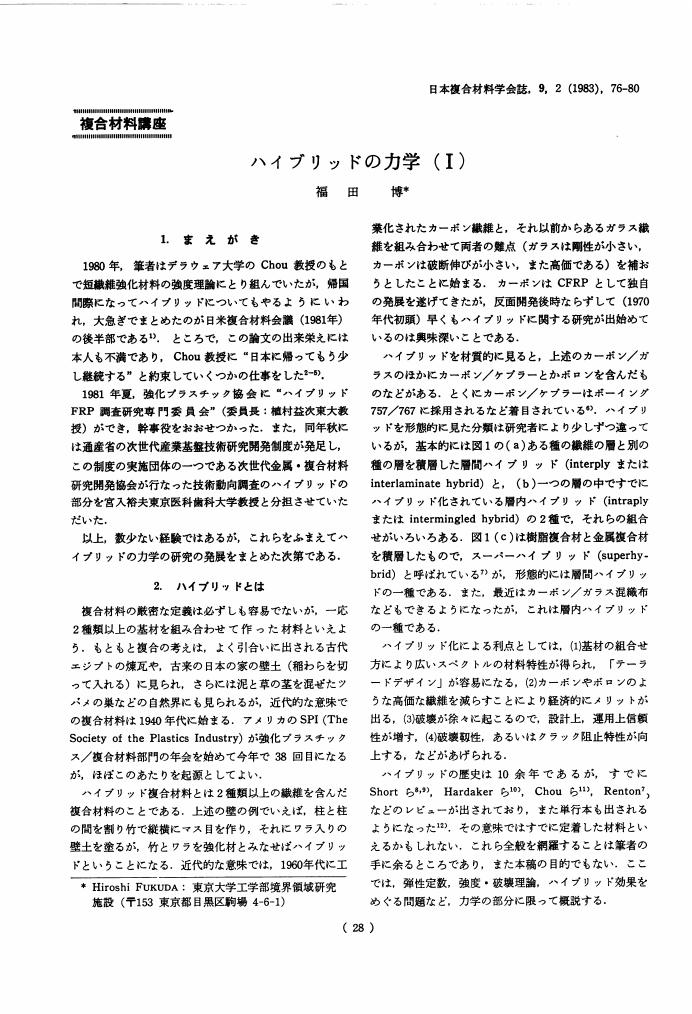3 0 0 0 OA アメリカズ・カップ挑戦艇〈阿修羅〉, 〈韋駄天〉の構造設計および建造
2 0 0 0 OA 固体の付着と表面自由エネルギー
- 著者
- 堤 和男
- 出版者
- 日本複合材料学会
- 雑誌
- 日本複合材料学会誌 (ISSN:03852563)
- 巻号頁・発行日
- vol.2, no.3, pp.107-113, 1976-07-31 (Released:2009-08-11)
- 参考文献数
- 41
2 0 0 0 OA こんなところに複合材料
- 著者
- 岩堀 豊
- 出版者
- 日本複合材料学会
- 雑誌
- 日本複合材料学会誌 (ISSN:03852563)
- 巻号頁・発行日
- vol.27, no.3, pp.173-176, 2001-05-15 (Released:2009-08-11)
- 参考文献数
- 7
2 0 0 0 OA 航空機における複合材損傷例と修理上の問題点
1 0 0 0 OA 積層CFRPの曲げ強度と疲労強度
- 著者
- 古田 敏康 野口 義男 松嶋 正道
- 出版者
- 日本複合材料学会
- 雑誌
- 日本複合材料学会誌 (ISSN:03852563)
- 巻号頁・発行日
- vol.5, no.2, pp.68-72, 1979-04-30 (Released:2009-08-11)
- 参考文献数
- 7
This paper presents the results of the experimental investgation of the static and dynamic mechanical properties of laminated carbon fiber reinforced plastics (CFRP). The composites consist of denatured epoxy resin MRX-3501, # 241, # 3130 and reinforced high strength type carbon fiber, PYROFIL-XAS made by Mitsubishi Rayon Co., CARBOLON Z-3 by Nippon Carbon Co., and TORAYCA T-300 by Toray Co. These Laminated CFRP plates were fabricated with 24 plies of [0°, 45°, -45°, 90°] sym. laminates; symmetry of plies is about the laminate midplane. Flexural fatigue test results on normal test pieces and on hydrated test pieces soaked in water for two weeks were compared. The results of flexural fatigue tests showed the ratio of the flexural fatigue strength at 107 cycle to the static flexural strength to be 0.27-0.43. The fatigue strengths of normal test pieces not differ from that of hydrated test pieces in XAS/MRX-3501 and Z-3/# 241; however, they slightly differ in T-300/# 3130.
1 0 0 0 OA 産業用X線CTスキャナ
1 0 0 0 OA 平織強化CFRP材における繊維方向のヤング率の評価
1 0 0 0 OA ターボチャージャー用繊維強化樹脂製インペラー
- 著者
- 飯尾 光
- 出版者
- 日本複合材料学会
- 雑誌
- 日本複合材料学会誌 (ISSN:03852563)
- 巻号頁・発行日
- vol.21, no.5, pp.174-180, 1995-09-15 (Released:2009-08-11)
1 0 0 0 OA ハイブリッドの力学(I)
1 0 0 0 OA 光ファイバセンサによる大型複合材料構造のヘルスモニタリング
- 著者
- 村山 英晶 影山 和郎 成瀬 央 島田 明佳 鵜沢 潔
- 出版者
- 日本複合材料学会
- 雑誌
- 日本複合材料学会誌 (ISSN:03852563)
- 巻号頁・発行日
- vol.28, no.5, pp.176-188, 2002-09-15 (Released:2009-08-11)
- 参考文献数
- 14
- 被引用文献数
- 1 1
The purpose of structural health monitoring (SHM) is to lead a structure to be safer at a lower cost. In SHM, it is important to evaluate the actual state of the structure. Recently, fiber-optic sensors have been developed actively, and one can measure nearly all of the physical measurands of interest by them. Since they also have excellent characteristics such as high sensitivity, immunity from electromagnetic interference, good mechanical characteristics and distributed configuration, they have been applied to “smart structures.” Capability of quasi or fully distributed sensing is especially the significant advantage compared to conventional sensors. We have applied the fiberoptic distributed sensors to SHM in the field and we developed the integrated systems with the fiberoptic sensors and CAD/CAE for two large composite structures. These systems could give us useful information on the structural state, such as deformation and temperature during/after manufacture.
1 0 0 0 OA 一方向炭素繊維強化熱可塑性樹脂基複合材料の成形中における樹脂含浸挙動
- 著者
- 小林 訓史 田中 敦
- 出版者
- 日本複合材料学会
- 雑誌
- 日本複合材料学会誌 (ISSN:03852563)
- 巻号頁・発行日
- vol.38, no.2, pp.51-57, 2012 (Released:2012-12-10)
- 参考文献数
- 8
- 被引用文献数
- 2 4
In order to fabricate composite components rapidly, a micro-braiding technique have been proposed and investigated. In the present study, a simple model is proposed to predict the resin impregnation process based on the Darcy's law and the continuity equation. Bending modulus was also modeled considering the difference between tensile and compressive moduli of a carbon fiber and resin impregnation. To confirm validity of the models, carbon fiber reinforced polypropylene composites were molded under various molding conditions. Cross-sectional observation results indicated the model proposed was possible to predict resin impregnation. Four-points bending tests were also conducted on the composites. It is confirmed that bending moduli were well-predicted based on the proposed model.
1 0 0 0 OA 一方向積層CFRP平板の圧縮による連続脆性破壊挙動とエネルギー吸収
- 著者
- 上田 政人 高嶋 豊士 加藤 保之 西村 哲
- 出版者
- 日本複合材料学会
- 雑誌
- 日本複合材料学会誌 (ISSN:03852563)
- 巻号頁・発行日
- vol.36, no.3, pp.104-111, 2010 (Released:2011-03-05)
- 参考文献数
- 31
- 被引用文献数
- 1 1
Progressive crushing tests of unidirectionally laminated carbon fiber reinforced plastic (CFRP) rectangular plate were carried out to reveal its continuous fracture behavior and energy absorption. A special test fixture was developed for the test and fracture process of the CFRP was observed from its side section. Three types of trigger geometries, i.e. chamfer, steeple and V-shape trigger, were machined on each specimen. Film embedded V-shape trigger was also prepared to investigate the effect of initial cracks on energy absorption. The initial fracture behavior strongly affected the ensuing stable fracture process. It was clarified that V-shape trigger specimen was robust over the variation of gage length (unsupported length) as compared to chamfer and steeple trigger specimen which showed smaller energy absorption with longer gage length. A column-like part, which was called pillar in this paper, was observed between fronds under crushing. The fracture was much severe at pillar section than fronds section. Fiber fractures were observed periodically at 50-100 μm length in the pillar section, which coincides with the length of kink band in ultimate compressive failures of CFRP. It was revealed that the thickness of pillar was dominant factor on energy absorption of unidirectional CFRP.







